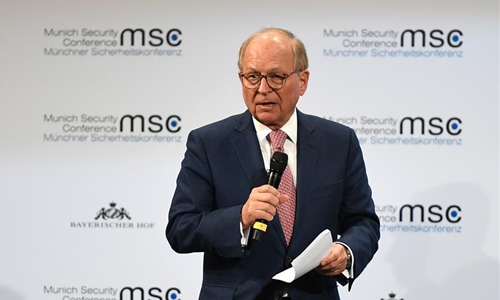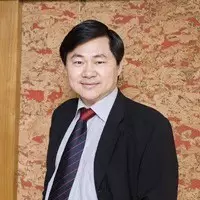Time to seek more inclusive world order in era of ‘westlessness
February 18 , 2020
Chairman of the Munich Security Conference (MSC) Wolfgang Ischinger addresses the closing session of the 56th MSC in Munich, Germany, Feb. 16, 2020.
The 56th MSC closed on Sunday as attendees didn’t share consensus on “Westlessness,” the theme of this year’s conference. The debates on “Westlessness,” which refers to the loss of common standing of what it means to be part of the West, would likely continue. (Xinhua/Lu Yang)
By Wang Huiyao |
President of the Center for China and Globalization(CCG)
China once again became the center of world attention at the just concluded 56th Munich Security Conference (MSC) themed “westlessness.”
Two implications can be observed from this theme. First, with the rise of emerging countries such as China, China has becoming a dominated subject in many discussions of the conference, including US Secretary of State Mike Pompeo and US Secretary of Defense Mark Esper’s very negative remarks on China. Second, rifts in the Western camp are increasing and deepening. With the US advocating “America First,” the US-Europe alliance has met unprecedented challenges. Meanwhile, the gap between some members within the European Union are also growing due to the impact of populism.
“The West is less Western… The world as a whole is less Western,” said Wolfgang Ischinger, chairman of the MSC, on February 10. This really shows that Western countries have gathered for the first time to reflect and rethink what went wrong and what can be done.
In 2019, the world witnessed various global challenges, such as US-launched trade wars, the paralysis of the WTO dispute settlement mechanism, and deadlocked international cooperation on climate change. Waves of anti-globalization, represented by populism and trade protectionism, are more prevalent. Divisions have spread from trade to politics, technology, military, religion and ideology. The world is undergoing profound changes and facing great unseen challenges this century, especially for Western countries.
Nonetheless, the trend of globalization can never be reversed. Constantly developed technologies and global value chains have entwined countries around the world. Not a single member of the international community can tackle all the challenges alone and play a world savior. In response to “westlessness,” countries should jointly explore a path in the world where the West and the East can coexist. For world to have a new narrative to evolve from the Cold War division of West and East, humankind should confront our common challenges such as climate change, terrorism, nuclear proliferation, trafficking, poverty reductions and epidemic diseases.
In order to do this, first of all, Western countries need to accept China’s peaceful rise and view China’s development as a contribution to the mankind and be tolerant to the path that China has chosen based on its successful experience in the past four decades. China also needs to be more open and should come up with a new convincing way of presenting itself, so as to dispel the West’s concerns over its rise.
The world is now moving toward multipolarity. Traditional Western powers no longer hold overwhelming superiority in terms of economic, political, technological and military influence over the world. Newly emerging countries such as China, Russia, India, Brazil and ASEAN countries will play more active roles in the world affairs. Many global issues can only be settled through international cooperation. The world needs to embrace new inventions and technological development together such as 5G, AI, Big Data, automation, blockchain and internet of things etc.
Today, Western countries are facing new challenges, which can be seen from the multiple crisis the West has encountered in recent years, including the refugee crisis, the financial crisis, and terrorist attacks and rising populism. Western countries should consider whether their model is applicable to all countries and whether they need to tolerate successful new models or have peaceful coexistence of the development paths of other countries.
The 2020 MSC is in essence the Western countries’ collective efforts to reflect on themselves and to seek for a better global development framework. It is the common challenge facing all countries to get rid of the divisions that separate the Western and the Eastern world, because emphasizing differences will only lead to further divisions.
Second, developing countries should assume more international responsibility and engage more in building and enhancing in innovation in global governane.
Western countries probably can take more consideration since newly emerging countries are much different than they were two decades ago. They are making more substantial efforts in contributing to world GDP growth, addressing more global issues, protecting intellectual property rights, promoting free trade, opposing counter-globalization, and contributing to a community with a shared future for humanity.
As the world’s largest developing country, China is responsible and capable of engaging in international affairs. Since the beginning of its reform and opening-up, China has made remarkable contributions to the world economy while boosting its own. According to the World Bank, China has enabled “more than 700 million rural people to lift themselves out of poverty, which accounts for more than 70 percent of global poverty population since early the 1980s.”
In recent years, China has proposed the Belt and Road Initiative and initiated new global governance institutions such as the Asian Infrastructure Investment Bank, which has, to some extent, filled the gap in the traditional global infrastructure building system. Meanwhile, as a determined advocate of multilateralism, China is also playing an irreplaceable role in promoting regional security, prosperity and stability.
Some countries are concerned about China’s rise. This requires China to make further exchanges with the world and further reform and opening-up. At a time when the international community is entangled in differences and debates, China should carry forward its long-held spirit which values harmony, and continue to build community with a shared future for humanity.
Third, all countries should jointly build a new globalized world with more equality, inclusiveness and fairness. The uncertainty of the humanity’s future is increasing, and division, confrontation, and shirking responsibilities will not solve the problems. Thus, we need a more inclusive and equal global order and inclusive globalization for all.
With the debate of the West is less or more, China needs to focus more on how to promote global development and adjust its role in the international community and make more contributions to the world.

Dr. Wang Huiyao is
president of the Center for China and Globalization(CCG),
the largest independent think tank in China, with over 100 researchers
and members of staff.
Topical News See more






